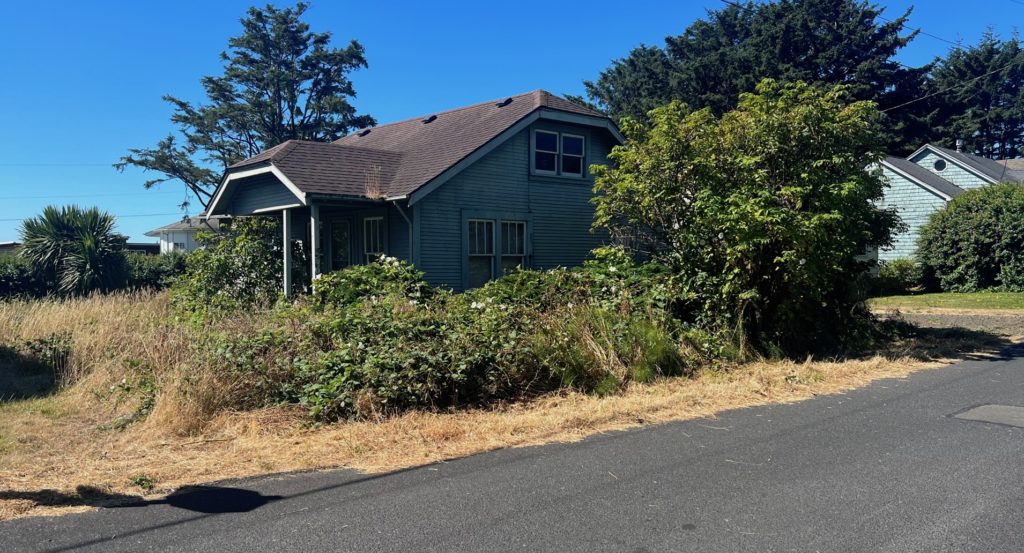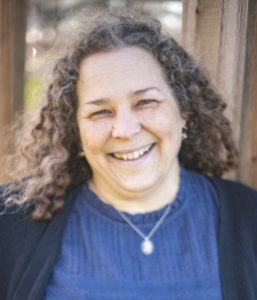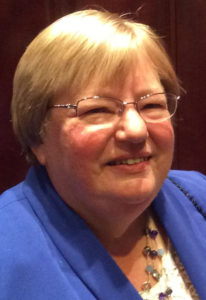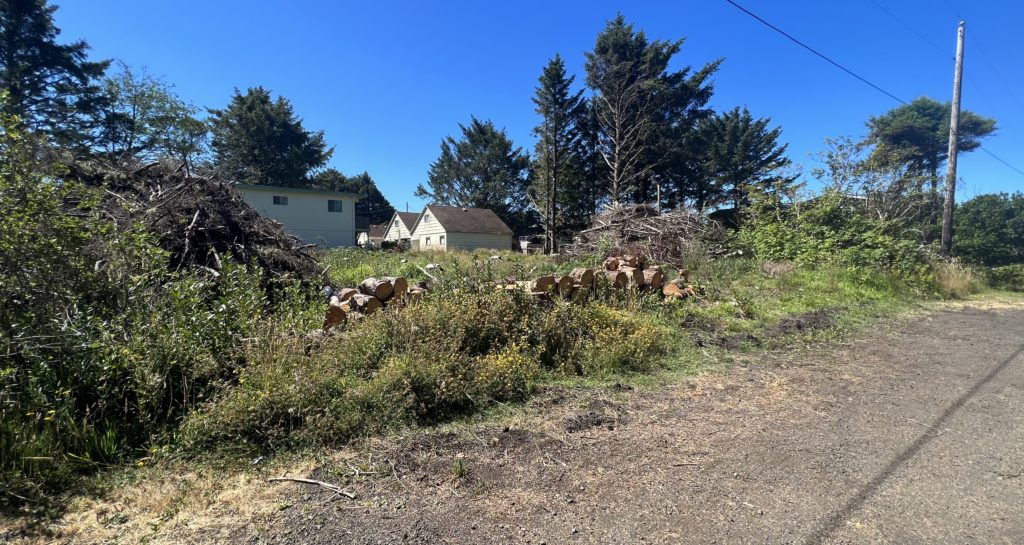
By QUINTON SMITH/YachatsNews.com
YACHATS – For at least the fourth year, an abandoned house on West Second Street in downtown Yachats is overgrown with weeds and blackberries.
On the south side of town, a property owner has set up living quarters in a small travel trailer, surrounded it with a tall fence and posted “No Trespassing” signs.
A steep wooded lot on Horizon Hill was cleared, graded, and terraced with large boulders last winter without a city permit, then abandoned by the contractor without slope or soil stabilization measures in place.
A large portable storage container has sat unused for more than a year in the parking lot of the Underground Pub at the corner of Beach Street and Ocean View Drive, blocking the views of drivers turning onto either street.
All are violations of Yachats municipal codes.

All have been not been dealt with for months because the city has no code enforcement officer or lacked a part-time judge to handle cases cited into municipal court.
It’s become such an issue that the city Planning Commission has taken the unusual step to send a letter to city manager Heide Lambert asking her to “make every effort” to hire someone to oversee code enforcement “as soon as possible.” The commission’s letter, sent by email last month, was copied to the mayor and four city councilors.
“We hope it raises the visibility of this issue and we get some action before the year is over,” commission chair Lance Bloch told YachatsNews.
The commission’s interest is two-fold, Bloch said.
Some members are concerned that no one is available to respond to complaints or enforce newer city codes regarding lighting, for example, or hedges that block views between driveways and city streets, or someone living in a travel trailer on their property. Others are concerned over simple quality of life issues like building lots overgrown with fire-hazard weeds or blackberries or piles of logging debris left behind on a downtown lot cleared nine months ago.
“It is disheartening to put in months of discussion on proposed city ordinances only to see the existing ordinances ignored,” the commission’s letter said. “The longer we delay in filling this position, the greater the surprise will be when we finally do.”
Despite repeated statements from council members and Lambert that code enforcement is a priority, no one has held the position since a contract with TCB Security of Newport lapsed in 2021. A temporary employee hired last spring to coordinate events in the Commons and do some code enforcement quit after two months.

Lambert, who became city manager in February, told YachatsNews that city personnel issues and union contract negotiations prevented her from focusing on code enforcement. But now that there is a contract, Lambert said she can begin determining what duties are best handled by current workers and what tasks can be paired for new hires.
“It’s not as quick as everyone wants it,” Lambert told YachatsNews. “But we’re taking baby steps in the right direction.”
This week, all Yachats property owners received a mailed reminder from the city that they needed to adhere to codes regulating noxious weeks and vegetation. It arrived 2½ months after the city’s July 1 municipal code deadline for controlling vegetation.
Code enforcement elsewhere
Code enforcement in cities or counties is a vexing problem, especially where there has been inconsistent or unclear monitoring in the past, or lack of communication or education by municipalities.

After fairly consistent enforcement for years, Yachats cycled through a series of contracted or temporary workers since 2017, finally letting the work end when its contract with TCB petered out in 2021. Despite regular comments from city council members that code enforcement was a priority, it fell by the wayside during the last 18 months of city hall leadership and staffing turmoil.
Approaches to the issue vary by city, especially based on their size and makeup of their residents.
Waldport, population 2,350, has no code enforcement officer. The work usually falls to the city manager or city planner, who on tough cases can call on a Lincoln County Sheriff’s deputy assigned to the city.
City manager Dann Cutter said Waldport’s system is complaint-driven, meaning that there is no city employee driving around looking for problems. The city’s planner deals with building code violations, and the city manager responds to nuisance complaints “a couple of times a week.”.
Most often, he said, people respond to fixing an issue. Cutter’s philosophy is that if the business or homeowner is making progress toward addressing the complaint, then the city won’t cite them or do the cleanup work itself and then put a lien on the property.
The city also has six neighborhoods which have homeowner associations, which Cutter says generally do a good job of policing issues in their areas.
But code enforcement is not always popular in a working class community like Waldport.
“There’s a big slice of Waldport residents who want code enforcement and a good segment who moved here to get way from it,” he said.
Toledo, population 3,500, dropped TCB Security for code enforcement in 2020 and allocated money for a community services officer beginning in July 2021. That person handles everything from parking issues, to nuisance calls, to helping shut down an illegal apartment building, to organizing community gatherings and events.

“That’s the beauty of having an employee do it, you can assign other duties,” said city manager Judy Richter.
It’s worked so well, that Toledo recently signed an agreement with the city of Siletz to handle its code enforcement. But Richter, who lives in Yachats and was once the city’s finance director, said Toledo is different in that it is a working community not a retirement/tourist community and has its own police department.
Newport, population 10,700, has 2½ community service officers in its police department, assigned to nuisance abatement, code enforcement and vacation rentals. A new half-time officer will be assigned to work Fridays and weekends, when most vacation rental complaints occur, said police chief Jason Malloy.
The community service officers deal with everything from issues involving homeless people, abandoned vehicles and houses, litter and debris, and overgrown building lots.
So far this year for example, Malloy said, the city has dealt with 36 abandoned vehicles and 110 cases of nuisances that are public health hazards.
If a problem violates a city code, Malloy said the officers try to work with the responsible party to correct it within 30 days. If no progress is being made, then a citation comes next, he said.
“It can be slow, cumbersome and it costs money,” Malloy said. “Our whole goal on this is voluntary compliance.”

Small steps in Yachats
Yachats took one small step this month by finally contracting with a municipal judge, who would hear any citations the city issues. But that system has rarely been used by previous code enforcement officers.
Lambert told YachatsNews that deputy recorder Kimmie Jackson is back in the office and – after complaints through the city’s “complaint tracker” system — has started sending out letters to property owners who lots are overgrown. But it is a complaint-driven system with no city employee currently making occasional rounds of town to see where there may be issues.
Others, including some Planning Commission members, believe that most Yachats residents either are not aware of the online complaint system, don’t know how to use it – or have given up trying to get the city to do something.

Because of limitations in the city’s union contract, Lambert said she can’t contract with someone to handle code enforcement. But Lambert said she can hire someone on a temporary basis until she sees how the person performs and how much time it takes.
“Is it a part-time, year-round job?” she asked. “What does it look like in the winter?”
Lambert says she is now concentrating on filling at least two of three openings in public works. There is also money in the 2022-23 budget for part-time jobs for a facilities coordinator, an event coordinator, projects coordinator and code enforcement. It’s a matter of bundling those tasks and finding the right person to do them, Lambert said.
What the Planning Commission does not want is to load more, smaller chores on city planner Katherine Guenther, said Bloch. They feel Guenther is already distracted too much by helping out with other issues in city hall and needs to focus almost exclusively on planning.
“Code enforcement is a much broader topic than just the planner,” Bloch told the commission during its discussion in August.
For her part during the discussion last month, Guenther encourage the commission to send Lambert the letter.
“You’re asking for something very different and harder to dismiss,” she said. “I think it’s a legitimate request. Ask away and see what you get.”
To see or use the city of Yachats complaint tracker system, go here
- Quinton Smith is the founder and editor of YachatsNews.com and can be reached at YachatsNews@gmail.com. Note: In June, July and August 2018 Smith temporarily contracted with the city as its code enforcement officer.



Whether on a local or national level, if laws are passed but not enforced, it reduces the credibility of the government. One option is to hire more and more police to enforce ever expanding laws. Another is to focus any laws on the critical areas that need attention, avoiding getting involved in every minor issue that someone might complain about.
In the case of a small village like Yachats, how much law enforcement can we afford?
Some of these complaints are valid; others frivolous. “Noxious vegetation” on a privately owned lot, come on. A tempest in a teapot.
I have some sympathy for the noxious vegetation issue – our yard has been taken over by more ivy and bindweed than we can keep up with, because our neighbor (actually one of the other “problem properties” mentioned in the article for a different issue) did not maintain their weeds, and on the other side of them, the invasive species are threatening the native species in one of our parks.
But still, I think the city is struggling to regroup after the years of COVID and staff turnover, and not everything can happen all at the same time. In addition, certain steps have to come before others, such as the labor issues being settled before we can get people on the tasks. It’s a complicated problem, with lots of moving parts. And my basic attitude is: all things in their proper time, as the city wades through the enormous number of tasks we have on our list. We’ll get there.
Regarding the invasive vegetation issue, would the money not be spent better providing more places to dispose of the vegetation? The prices the local transfer
station charges are exorbitant.
We need a code enforcer who works independently and has the authority to make enforcement decisions independent of the City Manager and elected staff. The process, including the complaint, applicable ordinance, analysis of the ordinance and applicable policies, and the final resolution should be public information.
We also need oversight. The current process is a black box, where the complaint and purported resolution are reported monthly to the City Council without enough detail or analysis to allow meaningful quality control or oversight. The monthly code enforcement report should be revised to include 1) a description of the situation that triggered the complaint (absent any personal identifying information); 2) an analysis of applicable codes or policies and; 3) the resolution. I also think the Planning Commission is in a better position to provide oversight of the code enforcement process than the City Council is. As a matter of fact, YMC 9.88.020 provides the Planning Commission with just that authority. All the City Council has to do is get out of the way.